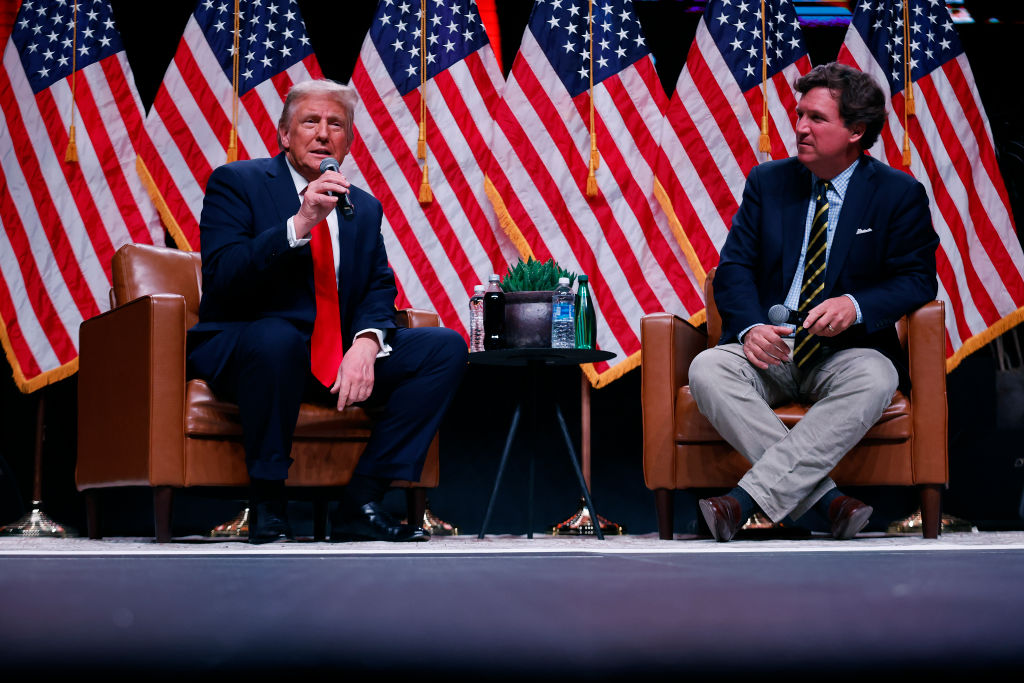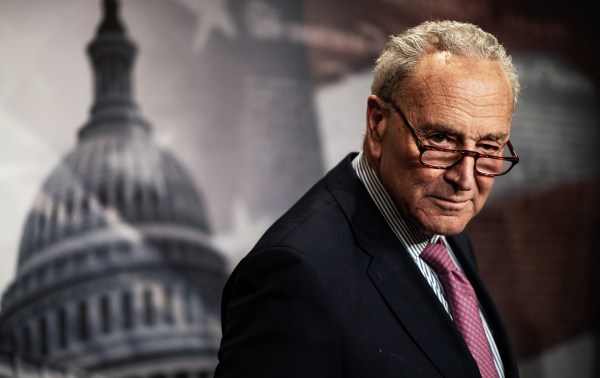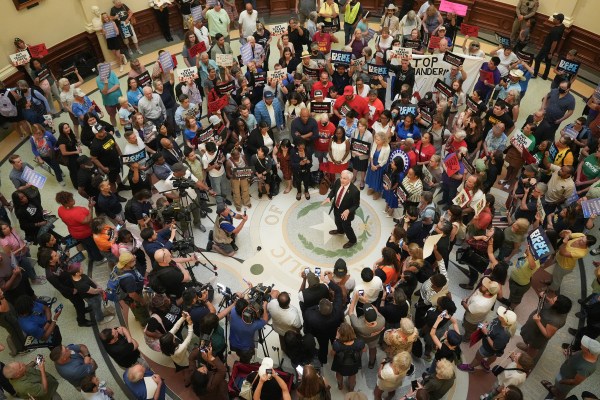It feels right and just that this election will end with Americans arguing over what two elderly men with broken brains actually meant to say while rambling semi-lucidly about their political enemies.
Two days after Joe Biden supposedly described Donald Trump’s supporters as “garbage” (I think he did), Trump supposedly suggested executing Liz Cheney. I think he didn’t:
“Trump Fantasizes About Shooting Female Rival in the Face” is how the Daily Beast characterized his comments. The Washington Post, a bit more precisely, claimed “Trump suggests ‘war hawk’ Liz Cheney should have guns ‘trained on her face’.” Some outlets understood him to mean that Cheney should face a firing squad.
Cheneyherself was stark in reply: “This is how dictators destroy free nations. They threaten those who speak against them with death. We cannot entrust our country and our freedom to a petty, vindictive, cruel, unstable man who wants to be a tyrant.”
I don’t think Trump was threatening her with death. It would be useful to the cause of defeating him for me to say insincerely that he was, as a final nudge to civic-minded conservatives to vote for Kamala Harris on Tuesday. But only propagandists prioritize what’s useful over what’s true.
Trump wasn’t calling for a firing squad, he was resurrecting ye olde “chickenhawk” smear of the Iraq War era. Many doves at the time insisted that war supporters were hypocrites unless they were willing to enlist themselves—and that logic is tailor-made for an audience that would turn out for an event hosted by isolationist (and amateur demonologist) Tucker Carlson. When Trump sneered at Cheney for being a “radical war hawk” and said “let’s put her with a rifle,” he plainly wasn’t imagining a firing squad. When a firing squad assembles, the condemned doesn’t get to shoot back.
What he meant, I suspect, is to call her a coward who wouldn’t dare condone foreign interventions if she had to face the enemy’s rifles on the battlefield herself, never mind how he handled the call of duty when he had the opportunity to serve. And indeed, that’s what he claimed in a Truth Social post on Friday.
But I understand why others heard him differently. His reference to “nine barrels shooting at her” was weirdly specific and did call to mind a firing squad, not a military skirmish. The detail about the guns specifically being “trained on her face” was gratuitous and unnervingly vivid. And what he said wasn’t said in a vacuum: A few months ago, he promoted a user’s post on Truth Social accusing Cheney of “treason” for her work on the January 6 Committee and calling for “televised military tribunals.”
No one owes this creature the benefit of the moral doubt, especially at this late hour. I can easily believe, in fact, that what came out of Trump’s 78-year-old mouth was a garbled blend of political logic and fascist impulse. He meant to make the “chickenhawk” point straightforwardly, perhaps, but the thought of one of his political nemeses facing a violent death pleased him so much that he instinctively layered elements of a firing-squad fantasy onto it.
It isn’t the first violent fantasy he’s had lately. And if Tuesday night doesn’t go well for him, it won’t be the last.
It also feels right and just, then, that this campaign will end with “the candidate of peace” openly salivating at the thought of one of his domestic enemies being shot at as the great and good American people prepare to hand control of the U.S. military back to him.
War and ‘peace.’
There are three things to remember as we suffer through the right’s contrived indignation that anyone might think kindly old Donald Trump has violent designs on his opponents.
One: They would have lost their minds at Kamala Harris had she lapsed into some similar reverie about guns being “trained on the face” of a political enemy (or if an Iraq-era Democrat had said something similar about Liz Cheney’s dad), particularly if she had a years-long habit of doing so. After nine years of Trump’s dreck, every drop of every ounce of Republican outrage at Biden and other Democrats for “irresponsible” rhetoric is insincere. But it is politically useful, and propagandists care only for what’s useful.
Two: If a second Trump presidency is as dystopian as doomers like me expect and Liz Cheney somehow ends up before a military tribunal, you should trust with every fiber of your being that most people on the American right will strain to rationalize and justify it. There’s no liberal principle left to which they feel greater allegiance than the allegiance they feel to their leader. The same people who tell us today that we’re crazy to think he’ll abuse his power to persecute Cheney will tell us next year that we’re crazy to think persecuting her wasn’t warranted.
Three: To be clear, most of Trump’s supporters have no problem with “radical war hawks.” Many of them are “radical war hawks.” Many of the people around Trump himself are “radical war hawks.”
It should go without saying by now, but Trump doesn’t divide the world between hawks and doves, Republicans and Democrats, or whichever other ideological fault line you prefer. He divides the world between friends and enemies. That partly explains why, as I wrote yesterday, his “populism” is an inch deep in substance. If given the option to ally himself with a “radical war hawk” who idolizes him on the one hand or an “America First” isolationist who finds him problematic on the other, there’s not an iota of doubt which he’d choose.
We’re talking about a man who, in his first term, staffed up with the likes of John Bolton, Mike Pompeo, and Nikki Haley, each of them every inch Liz Cheney’s equal as Reaganite hawks. To this day, some of Trump’s favorite Republican cronies in the Senate are among the chamber’s staunchest interventionists. Tom Cotton, Lindsey Graham, and Marco Rubio are welcome guests at his events despite the fact that their approach to foreign policy veers closer to George W. Bush’s than to J.D. Vance’s.
Liz Cheney herself proves the point. No matter how many times Trump claims that her supposedly bottomless appetite for war has led her to despise him, the fact remains that she endorsed him in 2016 and again in 2020 and voted no on his first impeachment. Nor did he appear to have any problem with seeing her ascend the ranks of the House Republican leadership, her “radical war hawk” preferences notwithstanding. Only when she supported impeaching him for the coup attempt that led to January 6 did he start daydreaming about enemy rifles being pointed at her face.
His dispute with her has nothing to do with foreign policy and everything to do with the fact that, to paraphrase John Kelly, Cheney doesn’t believe Trump should have the ability as president to do anything he wants, anytime he wants. “The candidate of peace” doesn’t care about peace, he cares about total personal impunity and will demagogue anyone who won’t grant it to him with any political weapon available.
“Warmonger,” “RINO,” “communist”: In his telling, there’s always an ulterior motive when someone seeks to hold him accountable. Of all the ways in which Trump is guilty of psychological projection toward his opponents, none is more considerable than how he dresses up personal grudges as ideological disputes.
If you’re ever tempted to take his rhetoric about war and peace seriously, consider the double standard he and other MAGA Republicans routinely practice toward displays of American strength.
Every time the Biden-backed Ukrainian military inflicts some damage on Russia, bleats of “World War III!” reliably sound from the populist intelligentsia. At one point this year, J.D. Vance stooped so low as to say that “if Donald Trump wanted to start a nuclear war with Russia, Mike Pence would be at the front of the line endorsing him right now.” We must take care not to provoke a fellow nuclear power, you see.
Yet when Trump was asked a few weeks ago by the Wall Street Journal how he would have handled Russia’s invasion, he claimed to have had this exchange with Putin while president: “I said, ‘Vladimir, if you go after Ukraine, I am going to hit you so hard, you’re not even going to believe it. I’m going to hit you right in the middle of fricking Moscow. … You’re going to be hit so hard, and I’m going to take those f— domes right off your head.’”
You can worry earnestly about World War III or you can attack Russia “in the middle of fricking Moscow,” but you can’t do both. I invite you to imagine the reaction among the very principled doves of the populist right if “radical war hawk” Liz Cheney—or President Joe Biden—had proposed bombing the Kremlin if Putin dared lay a finger on poor Ukraine.
It’s still not too late for Mike Pence to endorse, I guess.
Enemies foreign and domestic.
“Trump wasn’t really going to bomb the Kremlin,” you might say. “Assuming that conversation even happened, he was talking tough to try to deter Russia from invading.”
I agree. But if you recognize it’s a bluff and I recognize it’s a bluff, what are the odds that Putin also recognized it as a bluff? How much deterrence is there in an obviously empty threat?
Deterrence, not “World War III!”, is the reason “radical war hawks” like Liz Cheney support American military alliances in Europe and the Far East. It’s not a happy accident that Putin’s invasion of Ukraine hasn’t spilled over into NATO territory and drawn in countries like Poland. We can and will debate until the end of time whether stationing American troops near expansionist powers increases the odds of war by raising the risk of a confrontation or reduces them by raising the cost of aggression by those powers. But you’re a child if you don’t recognize that preventing war, not “starting a nuclear war with Russia,” is the goal of those alliances.
Insofar as “the candidate of peace” goes about dismantling them and their record of meaningful deterrence in a second term, his fickle tough-guy bluster will not completely fill the vacuum in their absence. On the contrary: If and when Trump’s bluffs are exposed for what they are and the Pax Americana starts to unwind, lots of war will follow overseas from the provocative weakness he’s displayed. You may recall that “America First” foreign policy the first time around produced peace for the United States in the short term and something not so peaceful in the longer run, at immense cost here and abroad.
How is it, then, that “radical war hawks” like Tom Cotton can coexist so comfortably with “the candidate of peace”?
I think it’s a simple matter of priorities. The newly nationalist right can put aside its differences on foreign policy because its various factions broadly agree that the greater enemy is the “enemy from within.” That’s the only way to explain how Cotton, a Ukraine supporter, has ended up on the short list of potential defense secretaries for a guy who believes Volodymyr Zelensky is somehow to blame for the war with Russia. I don’t think Trump views Cotton primarily as a “hawk,” I think he views him as a friend who supports using the U.S. military against American rioters.
That’s the kind of “creative thinking” Trump wants in his Cabinet in a second term. He can work with deputies who disagree with him about foreign enemies; what he wants is their support in dealing ruthlessly with domestic ones. “The candidate of peace” neither expects nor desires domestic peace.
On Friday, New York Times columnist Michelle Goldberg compared the dread she’s feeling about Election Day with the dread one feels while waiting for the results of a biopsy. In case Tuesday’s diagnosis turns out to be malignant, she imagined how Trump’s mass-deportation program might be received:
If this happens, there will almost certainly be large protests. And when they break out, it is not far-fetched to think Trump would order the military to violently suppress them; the generals now warning about a second Trump term say he wanted to do just that in the past. This is what I envision when I think of MAGA fascism: people demonized as “vermin” being dragged off to camps, while dissent is violently crushed by the armed forces. I don’t know how anyone who has listened to Trump and those around him can dismiss this scenario as hysterical.
I’ve envisioned something similar playing out. It isn’t hysterical, it’s likely. There will be a serious effort to deport illegal immigrants en masse, successful or not; it will draw enormous disruptive protests, particularly if mass deportation is as “bloody” as Trump expects; and he will demand that his deputies crack down hard on protesters with the sort of “iron fist” he admires in Xi Jinping. Goldberg is right when she says that he’s made those demands before.
If the scenario she imagines never comes to pass, it will only be because Trump somehow ended up being advised once again by conscientious figures like Mark Esper and Mark Milley. And that’s quite unlikely: The whole point of his second term is to purge the government of “disloyal” subordinates who won’t blindly follow his orders like certain generals he’s been known to admire once did with their own leader—or so he believes.
How, then, can anyone fault Liz Cheney for detecting a threat in Trump’s “chickenhawk” jab? She’s been dealing with the personal consequences of having him as an enemy for years. He despises her, he believes in using the power of the state against people he despises, and if he wins on Tuesday, he’ll conclude that he has both a legal and political mandate to do so. If you knew that a mafia don had been heard fantasizing vividly about guns being pointed at your face, the “context” of his fantasy wouldn’t reassure you. Go figure that Cheney doesn’t feel reassured by “context” when the mafia don in this case is poised to gain control of the Pentagon and the Justice Department.
Nothing good can come from any of this—except one thing.
I think it would be very funny if the Trump campaign, spooked by the possibility that he’s offended “Cheney Republicans,” deployed Nikki Haley on the trail in the race’s final days to try to soothe those voters. She’s pathetically eager for the chance, but Trump has thus far resisted—and why wouldn’t he? According to the latest Times national poll, he’s winning as many Democrats as Harris is winning Republicans. (Four percent apiece.) He doesn’t need Haley’s help to keep GOPers inside the tent; they’re not going anywhere, it seems, the hype about a big Never Trump crossover vote this year notwithstanding.
But I hope he relents and puts Haley to work anyway, as it would be a scream to watch her make excuses for “the candidate of peace” after he menaced Liz Cheney for having the same foreign policy as Nikki Haley. The great Reaganite hope of this year’s Republican primary knifing a fellow Reaganite like Cheney on behalf of a fascist who destroyed Reaganism would be the perfect ending to the decade-long corruption of the right that’s led us to this moment, a coup de grace delivered by a servile moral weakling against a rare conservative with real courage. I’m sure Haley is willing. All Trump needs to do is ask.







Please note that we at The Dispatch hold ourselves, our work, and our commenters to a higher standard than other places on the internet. We welcome comments that foster genuine debate or discussion—including comments critical of us or our work—but responses that include ad hominem attacks on fellow Dispatch members or are intended to stoke fear and anger may be moderated.
With your membership, you only have the ability to comment on The Morning Dispatch articles. Consider upgrading to join the conversation everywhere.